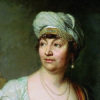Madame de Stael

Madame de Stael
Anne Louise Germaine de Staël-Holstein, commonly known as Madame de Staël, was a French woman of letters of Swiss origin whose lifetime overlapped with the events of the French Revolution and the Napoleonic era. She was one of Napoleon's principal opponents. Celebrated for her conversational eloquence, she participated actively in the political and intellectual life of her times. Her works, both critical and fictional, made their mark on the history of European Romanticism...
NationalityFrench
ProfessionWriter
Date of Birth22 April 1766
CountryFrance
Between God and love, I recognize no mediator but my conscience ...
I am glad that I am not a man, for then I should have to marry a woman.
Anything that happens gradually is always irrevocable.
... in the history of the human mind there has never been a useful thought or a profound truth that has not found its century and admirers.
women have no existence except in love; the history of their life begins and ends with love!
[Ridicule] laughs at all those who see the earnestness of life and who still believe in true feelings and in serious thought ... It soils the hope of youth. Only shameless vice is above its reach.
No nation has the right to bring about a revolution, even though such a change may be most urgently needed, if the price is the blood of one single innocent individual ...
The thing that must be preserved in all situations whatever is the reputation of one's character.
Whatever efforts one may make, one must revert to the realization that religion is the real basis of morality; religion is the real and perceptible purpose within us, which alone, can turn aside our attention from things. ... The science of morality can no more teach human beings to be honest, in all the magnificence of this word, than geometry can teach one how to draw.
Prayer is the life of the soul.
inventiveness is childish, practice sublime.
Anyone who can see as far as tomorrow in politics arouses the wrath of people who can see no farther than today.
[To Bonaparte, when asked why she meddled in politics:] Sire, when women have their heads cut off, it is but just they should know the reason.
we always cut our poetical theories to suit our talent ...